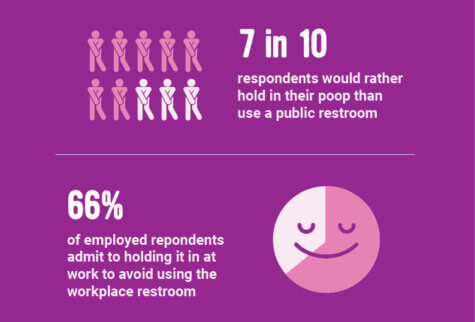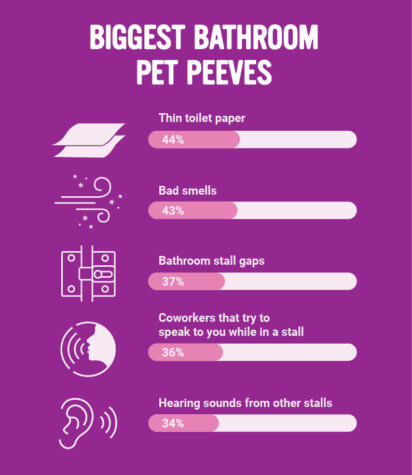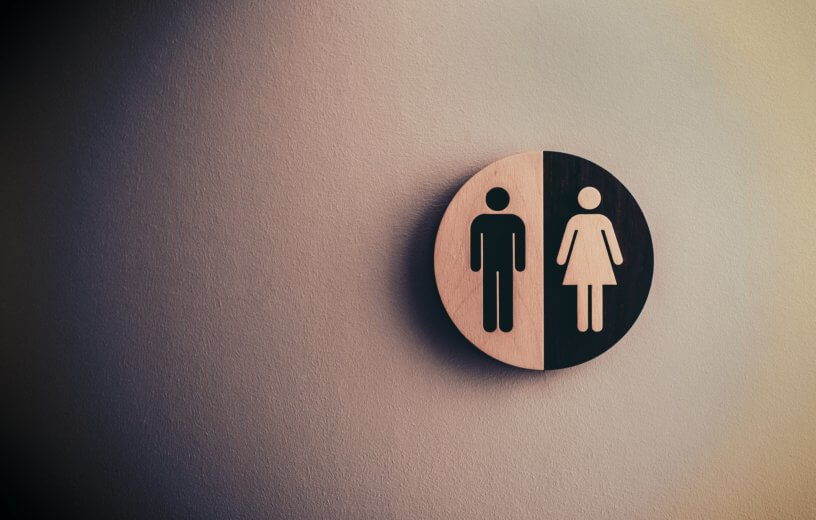-
Survey reveals that 46% of people don’t do their business in public because they don’t want anyone hearing them.
-
64% of respondents report battling constipation — from not using the bathroom at their office.
-
Top reason people avoid pooping at work: Fear of taking longer on the toilet than a co-worker.
NEW YORK — Many Americans have a fear of public speaking, but it turns out even more dread having to poop in public! Seven in 10 Americans confess to holding it in all to avoid using a public restroom.
A new survey of 2,000 Americans asked about their bathroom preferences and found 69 percent hate going in public so much, they hold it in until they can be in the comfort of their own home. Men were also more likely to agree with this mindset, with 74 percent saying they hold it in compared to 65 percent of women. On average, Americans are holding it in for two-and-a-half hours in order to poop at home – and men are willing to wait three hours, compared to two hours for women.

Throne sweet throne
Why are people putting themselves through this discomfort? The survey found 64 percent of respondents agree they’re just uncomfortable with using a public restroom when going “number two.”
Conducted by OnePoll on behalf of MiraLAX, the survey also asked respondents what the most important points of public restroom etiquette are and found peeping through the gaps in the doors is the biggest violation (48%).
Forty-six percent of those who are uncomfortable with using a public restroom say it’s because they don’t want anyone hearing them do their business. An additional 44 percent say they’re uncomfortable pooping in a strange or unknown environment and three in 10 are a little “pee shy,” citing they don’t like going to the bathroom around other people.

Are office toilets as bad as public bathrooms?
The poll also delved into the role pooping plays in the workplace – and the separate set of anxieties that come with the territory.
As many Americans return to the office for the first time in months, one in five American office workers cite having to use the office bathroom as a prime reason they’re stressing about the return to the office. Among employed respondents (approximately 1,300 people), 71 percent say they have a special bathroom they specifically use for number two at work.
Moreover, 66 percent of American workers admit to holding it in to avoid using their workplace restroom. As a result, this has caused a staggering 64 percent of workers to become constipated.
“As more and more workers return to their offices and are forced to revisit pre-pandemic bathroom habits, workstipation, the stress associated with ‘going’ at the office resulting in a backed-up gut, is likely to rear its ugly head,” says David Ball, General Manager and Vice President Marketing – Digestive Health at Bayer, in a statement. “With so many workplace bathrooms considered uncomfortable, it is important Americans are armed with effective solutions when constipation arises to aid in helping them go comfortably.”

Workplace toilet woes
Aside from low-quality toilet paper and bad smells, other workplace bathroom pet peeves employees have include coworkers trying to talk to them while they’re in a stall (36%) and witnessing co-workers walk out without washing their hands (31%).
Seven in 10 employed respondents add they feel self-conscious about pooping at work – with the top reasons including fearing they use the restroom longer than others (50%) and, in turn, having their co-workers judge them for taking too long (40%).
“Americans deserve to feel comfortable when it comes to pooping at work, in spite of the many reasons workplace bathrooms can be a less-than-ideal experience, as avoiding going can cause much discomfort,” Ball continues.
